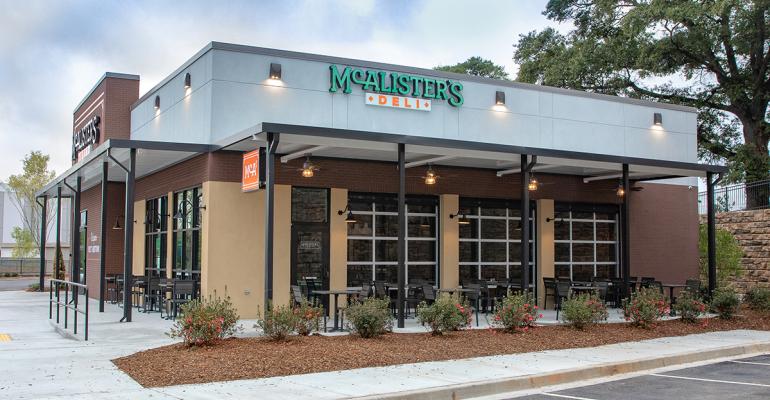If founders, chefs and other creatives are the beating heart of the restaurant industry, then franchisees are the veins delivering their ideas to all corners of the globe. Franchising is critical to the success of the industry, allowing brands to quickly scale their big ideas using other people’s capital. And whether it’s a mom-and-pop restaurant owner with one or two franchised restaurants or a seasoned veteran whose influence in the industry is well-known, franchisees — with all their individual attributes, styles and personalities — make a huge impact on the success of a business.
In this week’s installment of Franchisee Spotlight, we spoke with Taral Patel — a first-time franchisee and owner of a McAlister’s Deli in London, Ky. that opened in Feb. 2023 — about his family background in franchising and what it’s like to be a business owner at the young age of 21.
Store count: 1 McAlister’s Deli (so far) in London, Kentucky, with a second nearby store opening soon, and more in the long-term pipeline.
 All in the family
All in the family
“I grew up in a family that has been in the hotel franchise business for three generations. Franchising has always been a very comfortable business model for us because it removes a lot of the hassles that independent business have to go through. Just from learning from my grandfather and my father, I knew I wanted to get into my own business…Back in 2019, we purchased a hotel, and I was talking to the seller, who became a good friend and introduced me to the restaurant business. So that initially sparked my interest.”
Moving from hotels to restaurants
“Financially, hotels are CapEx-intensive, and can cost millions of dollars, and the ROI is not as good. Whereas the restaurant business, initial investments are not as crazy… and you can usually recoup your investment and within a couple of weeks or months…Also, hotels are 24/7/365, whereas restaurants, you have a little bit more flexibility in your operations and can close on holidays to spend time with your family.”
Clearing financial hurdles
“I was very fortunate that I had my family’s backing. For the initial equity injection, financing from a bank was really difficult for us because we were sourcing financing right out of COVID in 2021. Banks were starting to get back to normal then, but it was still very difficult being so young and also being a new franchisee, that we had several banks turn us down just because of that.”
Why McAlister’s Deli
“My friend mentioned that a 3,000-square-foot building can do over a million dollars in revenue. I did not believe that at first, just because I had experienced the hotel business with my family, where that kind of revenue is not something you’d expect….With McAlister’s, there are no fryers, no grills or anything-- you're just assembling sandwiches. The most cooking we do is baking our potatoes and our cookies, and everything else is ready for us. A lot of employees really appreciate that [kind of work] too.”
Juggling school and franchise ownership
“I learned time management, how to prioritize things and juggle several things at once, and also, I basically did not get any sleep in the first three to four weeks of opening, because my classes were ending at that time and I had to study for exams right around opening day…It was very difficult but it was also fun. During business hours, 9-5, I was working at McAlister’s and then I went home and studied, left in the morning for class and then after my class was over, I’d go back.”
Learning on the job
“I learned you have to be consistent in the food business, because if you mess up even once, you’re more than likely going to lose that customer. So that was very different from the hotel business where if you fall short of customer expectations once, you can apologize and explain the situation, and most guests will give you another chance. If you go to McAlister’s and you don’t like the experience, then you could just go to Panera….Also learning to manage people. At one point, we had 85 employees, and that was challenging because everyone has their own needs and issues. One day, we had seven people call out and we had 15 scheduled, which was almost half of our employees that day. So that’s when you’re calling people to get them to come in when lunch is 30 minutes away and you know you’re going to have lines out the door.”
Why he hired so many employees
“A couple of the stores that opened right before us had so many issues with hiring, and getting employees to show up during training week or opening week….Based off my manager, we opted to hire more employees than we needed because it's better to have more employees than you need. We were expecting a lot of employees not to show up, but luckily most did. And then, because we had such a good opening week, we hired a few more to make sure our employees weren’t feeling overworked or burnt out.”




![Smoothie King Ribbon Cutting Terminal A_01[95].jpg](https://www.nrn.com/sites/nrn.com/files/styles/article_related_thumb_standard/public/Smoothie%20King%20Ribbon%20Cutting%20Terminal%20A_0195.jpg?itok=WNYpNsAy)
